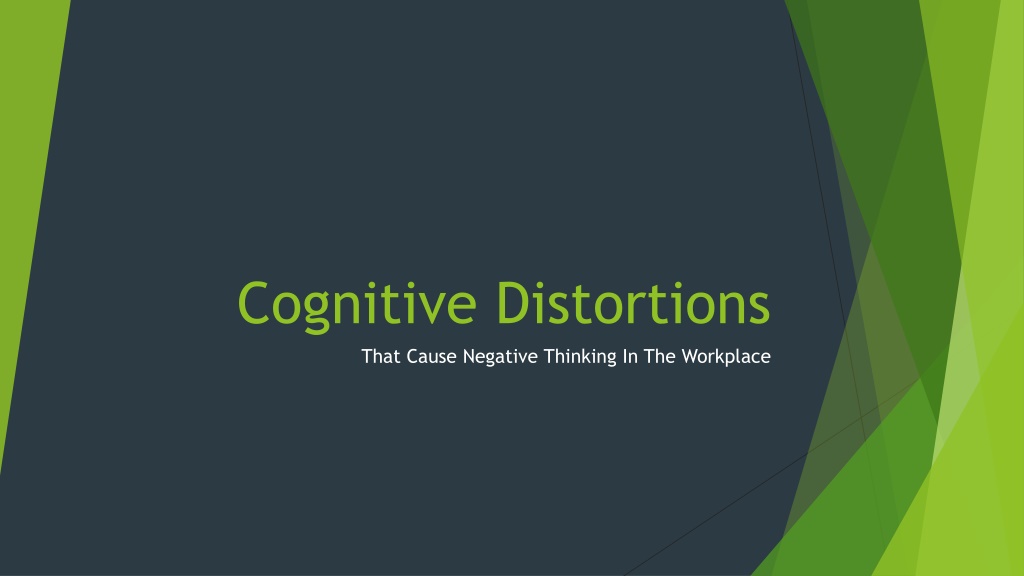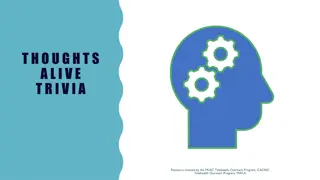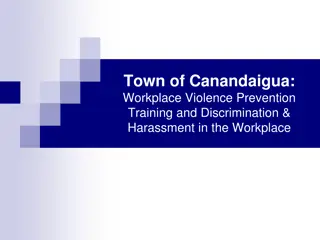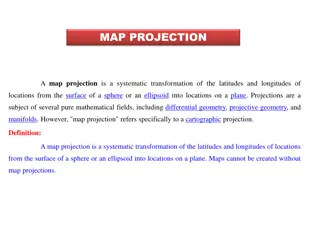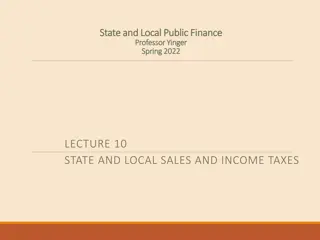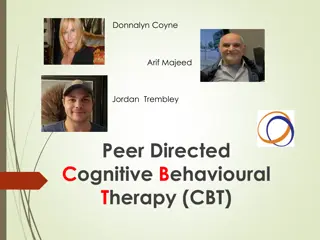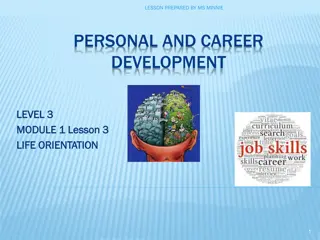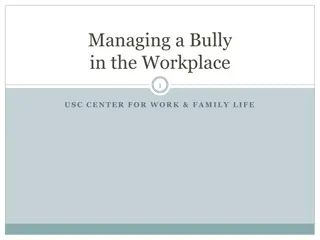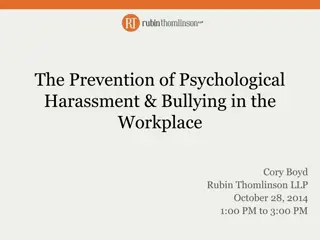Recognizing Cognitive Distortions in the Workplace
Understanding and managing cognitive distortions can help combat negative thinking in the workplace. Common distortions include all-or-nothing thinking, overgeneralization, mental filtering, jumping to conclusions, and emotional reasoning. By tackling these distortions, employees can improve their mindset and performance at work.
Download Presentation

Please find below an Image/Link to download the presentation.
The content on the website is provided AS IS for your information and personal use only. It may not be sold, licensed, or shared on other websites without obtaining consent from the author. Download presentation by click this link. If you encounter any issues during the download, it is possible that the publisher has removed the file from their server.
E N D
Presentation Transcript
Cognitive Distortions That Cause Negative Thinking In The Workplace
All-or-Nothing / Polarized Thinking Black and White Thinking Can t See the Gray This can change by the day Monday you are on one side of the spectrum Friday you are on the other side. Example: The moment your boss proposes remote work, you might think that you will not succeed in doing it. I never get what I want, the world is out to get me, and I can never win.
Overgeneralization One small mistake at work leads you to feel stupid and like a failure. Example, you receive a poor Performance Evaluation that is reflective of one isolated incident and it leaves you with hurt feelings and feeling like you are not any good at your job. This person may: Look for different work Feel like their boss doesn t like them Feel like they can t do their job Feel like they went into the wrong line of work Magnification or Minimization Catastrophizing
Mental Filter vs Disqualifying the Positives Mental Filter One employee dwelling on a single negative comment made by a coworker and viewing the project as hopeless Disqualifying the Positive An employee gets a positive review at work but rejects the idea that they might be competent More than having a hard time accepting a compliment This is especially concerning because it can facilitate the continuation of negative thought patterns
Jumping to Conclusions Mind Reading We make assumptions about what other people are thinking. A colleague makes an out-of-character comment one day in a meeting and you assume they are trying to cause problems Fortune Telling Conclusions and predictions based on little or no evidence Your boss reads a short email from a student with a complaint about a faculty member and comes to the conclusions that the faculty member is being a jerk. Actions to take: We should ask clarifying questions. Try not to assume If something seems out-of-character something bigger might be behind the scene Get both sides of the story before coming to a conclusion
Emotional Reasoning Refers to the acceptance of one s emotions as facts. I feel it, therefore it must be true. I feel sad .I must have depression. I feel worried I must have Anxiety Things to do: Self Talk Acknowledge that emotions change Don t set up camp
Should Statements Acting like a child. This is an attitude that extends from our childhood I should have gotten that promotion I should have gotten that award I should have had that idea I should have been put in charge of that project This builds a persona that we cannot live up to When we cling to should statements about ourselves or others we are generally disappointed by failure to meet expectations. Leads to anger and resentment No Entitlement
Labeling and Mislabeling Mental Health Labeling can be damaging I label myself anxious therefor I have anxiety I label myself a procrastinator therefor I procrastinate I label a coworker as old so they are dumb about technology I label a coworker as young so they are na ve and inexperienced Mislabeling is when we emotionally and unreasonably label someone. My boss makes me anxious so they must be a narcissist Racial and sexual labeling is also a big problem in the workforce What to do: Acknowledge that everyone labels Identify how you label (awareness) Find ways of not labeling
Personalization Acting Like a Teenager The world evolves around me Take everything personally Assigning blame It is all about me Thoughts like: It is my fault this graduation ceremony failed I am to blame for my team not working well together What to do: Responsibility lies with everyone You are just one person and can t do everything Even though you may be the weakest link it is still a team responsibility
Fallacies Control Fallacies I am a helpless victim of fate I have complete control of everything Fallacy of Fairness Judges every experience by its perceived fairness Fallacy of Change Change makes everything better If my colleague gets a different job I won t have to deal with them anymore Change makes everyone worse Their replacement will be just as bad if not worse
Fallacies Continued Heaven s Reward Fallacy Just desserts. A belief that my struggles, suffering and hard work will result in a just reward How many examples can you think of where hard work and sacrifice did not pay off
Always Being Right Perfectionism and Imposter Syndrome I must always be right Being wrong is unacceptable I will fight to the metaphorical death to prove I am right It is an intellectual battle that must be won at all costs Costs: Hurt feelings Anger Resentment Anxiety
Techniques to Combat Cognitive Distortions Identification Build Awareness (Mindfulness) Grace Automatic Thought Record Fact or Opinion Outlines Ask clarifying questions Assume Jar Mentor Therapy
